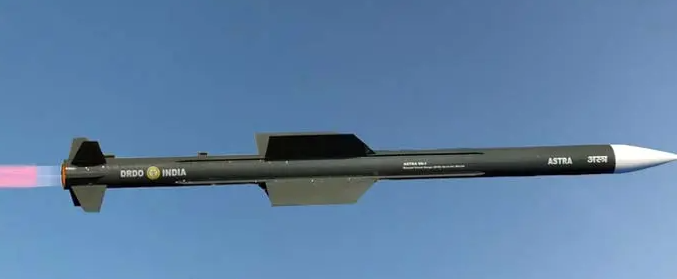Indian Air Force Approves Production of Astra Mark 1 Missiles (GS Paper 3, Defence)

Introduction
- In a landmark decision for India’s defense sector, the Indian Air Force (IAF) has approved the production of 200 Astra Mark 1 air-to-air missiles by Bharat Dynamics Limited (BDL).
- This development marks a crucial step forward in India's indigenous missile production capabilities, reflecting both technological advancements and strategic planning.
Development Background
- The Astra Mark 1 missile, developed by the Defence Research and Development Organisation (DRDO), represents a significant milestone in India's efforts to strengthen its air defense systems.
- The missile successfully underwent a series of rigorous tests, which culminated in its approval for mass production.
Key Details:
- Funding Approval: The Defence Acquisition Council (DAC) allocated over ₹2,900 crore for the Astra Mark 1 project during the 2022-23 fiscal year. This substantial investment was crucial for advancing the missile from the testing phase to full-scale production.
- Development Milestones: The Astra Mark 1 has completed all necessary tests, including performance evaluations and reliability assessments, ensuring its readiness for operational deployment.
Production Clearance
- The green light for production represents a pivotal moment for Bharat Dynamics Limited (BDL), which has been selected as the primary manufacturer of the Astra Mark 1.
- This clearance is expected to enhance India's defense manufacturing capabilities and strengthen the Indian Air Force's arsenal.
Key Details:
- Manufacturer: BDL will oversee the production of 200 Astra Mark 1 missiles, marking a significant boost to India's defense sector.
- Production Status: The approval follows a comprehensive review of the missile’s development and testing phases, affirming its readiness for large-scale manufacturing.
Integration with Aircraft
- The Astra Mark 1 missile is designed for compatibility with a range of fighter aircraft, including both foreign and domestically produced platforms.
- This integration enhances the flexibility and effectiveness of the Indian Air Force in various operational contexts.
Key Details:
- Aircraft Compatibility: The missile can be integrated with aircraft such as the Russian Su-30 and the Indian LCA Tejas, expanding its utility across different platforms.
- Operational Flexibility: This versatility allows the IAF to deploy the Astra Mark 1 in diverse combat scenarios, improving overall mission effectiveness.
Future Developments
- Looking ahead, the DRDO is advancing the Astra program with plans for the Astra Mark 2 and a long-range variant.
- These future iterations are designed to extend the missile’s range and enhance its capabilities, further strengthening India's air defense.
Key Details:
- Astra Mark 2: The upcoming variant is expected to have a range of 130 kilometers, providing improved operational reach.
- Long-Range Version: Plans are underway for a version with a range of up to 300 kilometers, aiming to bolster India's strategic air defense capabilities.
About Astra Mark 1 Missiles
- The Astra Mark 1 is India’s first air-to-air missile capable of engaging targets beyond visual range.
- With a reach of up to 110 kilometers and operational altitudes up to 20 kilometers, it represents a significant advancement in India's missile technology.
Key Details:
- Range and Altitude: Effective up to 110 kilometers in range and 20 kilometers in altitude, making it a formidable tool in aerial combat.
- Homegrown Technology: The missile features an Indian-made radar seeker and advanced guidance systems, showcasing the progress in domestic defense technology.
- Proven Performance: Since its successful test flight in May 2014, the Astra Mark 1 has demonstrated its reliability and effectiveness in enhancing India’s defense capabilities.
Conclusion
- The approval for the production of Astra Mark 1 missiles is a major achievement for India’s defense sector, highlighting the nation’s progress toward self-reliance in military technology.
- By moving from development to large-scale manufacturing, India is not only enhancing its aerial combat capabilities but also reinforcing its strategic autonomy.
- The ongoing development of advanced missile variants underscores India's commitment to maintaining a cutting-edge defense posture.
- As India continues to invest in and expand its indigenous defense technologies, the Astra Mark 1 missile program stands as a testament to the country's growing expertise in high-tech military advancements and its strategic focus on bolstering national security.
- This development is a crucial step in fortifying India's defense readiness and ensuring a robust and self-sufficient defense capability in the face of evolving global security challenges.


